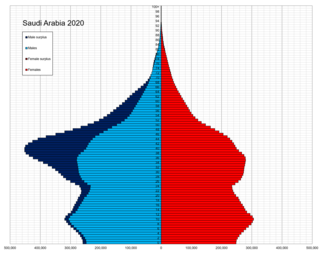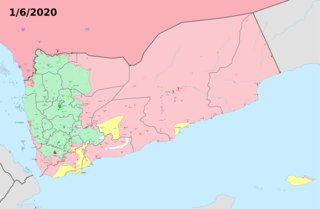
The Kingdom of Saudi Arabia is the fourth largest state in the Arab world, with a reported population of 33,413,660 as of 2018. A significant percentage of the nation's inhabitants are immigrants seeking economic opportunity, making up 37% of the total Saudi population. Saudi Arabia has experienced a population explosion in the last 40 years, and continues to grow at a rate of 1.63% per year.

The economy of Saudi Arabia is one of the top twenty economies in the world, and the largest economy in the Arab world and the Middle East. Saudi Arabia is part of the G20 group of countries.

The Arabian Peninsula is a peninsula of Western Asia, situated northeast of Africa on the Arabian Plate. At 3,237,500 km2 (1,250,000 sq mi), the Arabian Peninsula is the largest peninsula in the world.

Riyadh is the capital of Saudi Arabia and the largest city on the Arabian Peninsula. Located in the center of the an-Nafud desert, on the eastern part of the Najd plateau, the city sits at an average of 600 metres (2,000 ft) above sea level, and receives around 5 million tourists each year, making it the forty-ninth most visited city in the world and the 6th in the Middle East. Riyadh had a population of 7.6 million people in 2019, making it the most-populous city in Saudi Arabia, 3rd most populous in the Middle East, and 38th most populous in Asia.

Saudi Aramco, officially the Saudi Arabian Oil Company, is a Saudi Arabian public petroleum and natural gas company based in Dhahran.

Saudi Arabia, officially the Kingdom of Saudi Arabia, is a country in Western Asia constituting the vast majority of the Arabian Peninsula. With a land area of approximately 2,150,000 km2 (830,000 sq mi), Saudi Arabia is geographically the largest sovereign state in Western Asia, the second-largest in the Arab world, the fifth-largest in Asia, and the 12th-largest in the world. Saudi Arabia is bordered by Jordan and Iraq to the north, Kuwait to the northeast, Qatar, Bahrain, and the United Arab Emirates to the east, Oman to the southeast and Yemen to the south; it is separated from Egypt and Israel in the north-west by the Gulf of Aqaba. Saudi Arabia is the only country with both a Red Sea coast and a Persian Gulf coast, and most of its terrain consists of arid desert, lowland, steppe and mountains. As of October 2018, the Saudi economy was the largest in the Middle East and the 18th largest in the world. Saudi Arabia also has one of the world's youngest populations, with approximately 50 percent of its population of 34.2 million being under 25 years old.

The House of Saud is the ruling royal family of Saudi Arabia. It is composed of the descendants of Muhammad bin Saud, founder of the Emirate of Diriyah, known as the First Saudi state (1744–1818), and his brothers, though the ruling faction of the family is primarily led by the descendants of Ibn Saud, the modern founder of Saudi Arabia. The most influential position of the royal family is the King of Saudi Arabia. The family in total is estimated to comprise some 15,000 members; however, the majority of power, influence and wealth is possessed by a group of about 2,000 of them.

Human rights in Saudi Arabia are a topic of concern. The Saudi government, which enforces sharia law under the absolute rule of the House of Saud, have been accused of and denounced by various international organizations and governments for violating multiple human rights within the country. The totalitarian regime ruling the Kingdom of Saudi Arabia is consistently ranked among the "worst of the worst" in Freedom House's annual survey of political and civil rights. On 28 December 2020, the Criminal Court in Riyadh sentenced a prominent Saudi women's rights activist to nearly 6 years in prison, drawing a renewed attention to the kingdom's human rights issues. Qorvis MSLGroup, a U.S. subsidiary of Publicis Groupe, has been working with Saudi Arabia amidst its executions of political protesters and opponents for more than a decade to whitewash its record of human rights abuses.
The Saudi Arabia national football team represents Saudi Arabia in men's international football and The team's colours are green and white. Saudi Arabia are known as Al-Suqour and Al-Akhdhar, The team represents both FIFA and Asian Football Confederation (AFC).

Salman bin Abdulaziz Al Saud is King of Saudi Arabia and Custodian of the Two Holy Mosques.

The Saudi Arabian Football Federation (SAFF) is the football governing body of Saudi Arabia. Founded in 1956, its responsibilities include administration of club competitions and national teams. The founder of the Saudi Arabian Football Federation is his royal highness Prince Abdullah bin Faisal Al-Saud

Articles related to Saudi Arabia include:

Saudi Arabian cuisine encompasses the cuisines and foods of Saudi Arabia. In spite of the existence of many common dishes, Saudi Arabian dishes vary from a region to another as the culture itself varies.

The following outline is provided as an overview of and topical guide to Saudi Arabia:

Abdullah bin Abdulaziz Al Saud was King of Saudi Arabia and Custodian of the Two Holy Mosques from 1 August 2005 until his death.

The king of Saudi Arabia is the monarchial head of state and head of government of Saudi Arabia who holds absolute power. He is the head of the Saudi Arabian royal family, the House of Saud. The king is called the "Custodian of the Two Holy Mosques", a title that signifies Saudi Arabia's jurisdiction over the mosques of Masjid al Haram in Mecca and Al-Masjid an-Nabawi in Medina, the title has been used many times through the history of Islam. The first Saudi monarch to use the title was King Faisal, however, King Khaled did not use the title after him. In 1986, King Fahd replaced "His Majesty" with the title of Custodian of the Two Holy Mosques, and it has been ever since used by both King Abdullah and King Salman bin Abdulaziz.

Mohammed bin Salman Al Saud, colloquially known as MBS, is the Crown Prince of Saudi Arabia. He is currently serving as the country's deputy prime minister and is also Chairman of the Council for Economic and Development Affairs, Chairman of the Council of Political and Security Affairs, and Minister of Defense – the world's youngest at the time of his appointment. He has been described as the power behind the throne of his father, Custodian of the Two Holy Mosques King Salman. He was appointed crown prince in June 2017 following King Salman's decision to remove Crown Prince Muhammad bin Nayef from all positions, making Mohammed bin Salman heir-designate to the throne.
Women's education in Saudi Arabia is, as with many aspects of daily life, organized according to the principles of Islam, which is the official religion of the country, and which puts emphasis on the importance of knowledge, study, and understanding. The religion believes that obtaining knowledge is the only way to gain true understanding of life, and as such encourage both males and females to study. The way of practicing Wahhabi Islam has therefore led to segregation in education in Saudi Arabia, and in turn has created segregation in political, economic, and labor force environments. With the current struggle of social norms and laws, women have made great strides to obtain education in Saudi Arabia. However great these strides may be, there are consequences to the economy from not allowing women to have access to equal education, including potential economic struggle.

The Saudi Arabian-led intervention in Yemen is an intervention launched by Saudi Arabia on 26 March 2015, leading a coalition of nine countries from West Asia and North Africa, in response to calls from the pro-Saudi president of Yemen Abdrabbuh Mansur Hadi for military support after he was ousted by the Houthi movement due to economic and political grievances, and fled to Saudi Arabia.
This is a list of official football games played by Saudi Arabia national football team between 2010 and 2019.














